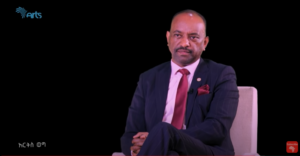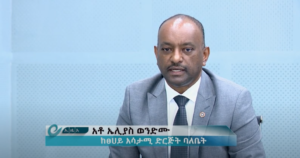ADDIS LIFE MAGAZINE – Tsehai Publishers is a ray of light in a world where access to knowledge is not always easily accessible, and its journey and flourishing within the North American literary landscape, a story that by all costs must be told. Having published nearly sixty books relating to Ethiopia, Africa and its Diaspora since its inception in 1998, Tsehai is a one-of-a-kind publisher whose global reach has been the product of founder Elias Wondimu-a man with a vision for giving Ethiopian writers greater access to their own visions in creative as well as academic publishing.

In September 1994, Wondimu left his country to participate the Twelfth International Ethiopian Studies Conference at Michigan State University in East Lansing, but his planned three week visit soon became indefinite. Later that year, he joined a Los Angeles-based Ethiopian magazine that was a gateway for information on social and political activities affecting the Ethiopian diaspora community and served as managing editor for the next six years. During the 1990s, Wondimu encountered numerous Ethiopians who were full of stories but had little idea where and how to go to about publishing them. A research job with an academic publisher at UCLA deepened Wondimu’s desire to provide a publishing outlet for those writing about Ethiopia. Eventually, and with the help of his family, he overcame the financial hurdles of day-to-day life and in 2001, he took on Tsehai Publishers as a full-time endeavour. He went on to publish Diary of a Journey to Abyssinia 1868, edited and annotated by leading Ethiopian studies scholar, Professor Richard Pankhurst. Soon thereafter he released the first English translation of the 16th century manuscript Futuh Al-Habasha: The Conquest of Abyssinia.
The rest is indeed history-Tsehai itself became a publishing hub dedicated to honoring Ethiopian voices and histories that would otherwise go unheard. “Our mission is driven by the need to provide a place where Ethiopians and Ethiopian researchers can make a stand and elaborate that they are a people of significant contribution to humanity,” Wondimu powerfully states. “Differing political ideologies have damaged our community in historical moments as well as the last several decades. Because of this, our intellectual class has largely dedicated its efforts to an already-determined political space. As a result, the critical analysis of history has been left aside. It is time to change this structure.”
Some of Tsehai’s books, including a biography of famous anti-fascist activist Sylvia Pankhurst, a medieval English text of Piers Plowman and a diary of the 1860s British expedition to Ethiopia, have won awards. Almost every month now Wondimu adds a release to his long-anticipated autobiography/biography series that includes works on: Mengistu Hailemariam, Tsegaye Gebremedhin, Tekalign Gedamu, and Rita and Richard Pankhurst. For those who have only just heard of Tsehai Publishers, it’s time to get caught up to the reality of its acclaim.
“We are not waiting to get noticed, we are here taking responsibility to tell our own stories,” Wondimu remarks. In addition to producing books on Ethiopian subjects, Tsehai is also interested in extending beyond Ethiopian-based literature. In the last few years, Tsehai co-published more than ten books with leading publishers from South Africa, Zimbabwe, India and the UK. “We are interested in engaging with different literary avenues, giving voice to a wide range of writers and world views.”
Tsehai Publishers, now based at Loyola Marymount University, has gained momentum not only among Ethiopian writers, readers and scholars, but within the larger publishing market in North America, heading offices in Los Angeles, New York, Johannesburg and Addis Ababa. In addition to offering a wealth of beautifully designed books, one of Tsehai’s missions is to provide a venue for new and upcoming writers, which for Wondimu is directly connected to his mission to represent voices that are international in scope.
“Ethiopian publications will always have to compete with the U.S. market, but that is precisely why Tsehai is so dynamic,” he says. “We know that the books and journals we produce are relevant and of high quality, which empowers us. We are trying to do the kind of work that requires dedicated effort and collaboration amongst a number of community members. Every design, every cover, is meant to tell a major story. Strong content, editorial excellence and thoughtful design are the components that Tsehai stands by.”
Tsehai’s first journal, the International Journal of Ethiopian Studies, is in its sixth volume and now available on JSTOR, the leading online database for academic publications. More recently, Wondimu has launched an literary journal called Ethiorica: A Journal of Literature and the Arts (EJLA). This journal will be published twice a year in Los Angeles and Addis Ababa, with one issue published in English and the other published entirely in Amharic.
Ethiorica is a name that combines the terms “Ethiopia” and “Africa” or “America,” but the significance of its title is much more complex. “Ethiorica is an intellectual collaboration between Ethiopians in America and those back home in Africa. For example, writers like Dinaw Mengistu who have achieved success in the literary world are now gaining momentum in the larger context of Ethiopian studies. As much as we must celebrate their successes, I think it is also important for the world, especially our own community, to learn of these writers in the early stages of their craft.”
As a published author, I can only say that I wish a venue like Ethiorica had existed sooner, during my struggle for literary recognition. Thankfully, Ethiorica has finally arrived to embrace writers both emerging and established. As Assistant Editor for the journal, I am excited to share in Elias’s vision: to help Ethiopian writers-creative, scholarly, and everything in between-gain the global recognition they deserve.
Indeed, Tsehai Publishers is well on its way to becoming a global force. As Wondimu expertly notes, “We are trying to create an international community of excellent writers whose works are informed by the Ethiopian experience, but more importantly, are of relevance to all.”
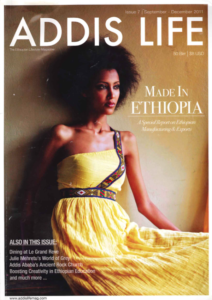
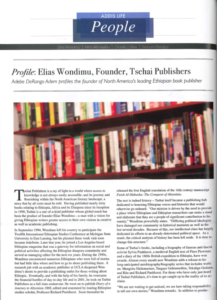
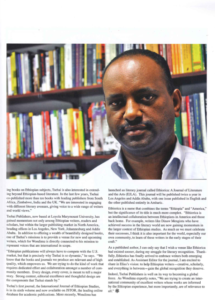
SOURCE: By Adebe DeRango for Addis Life Magazine (Issue 7)


